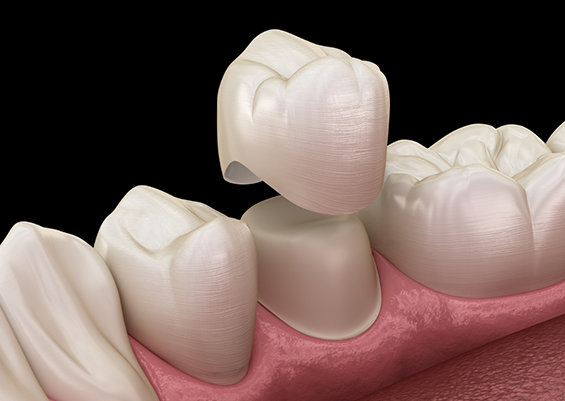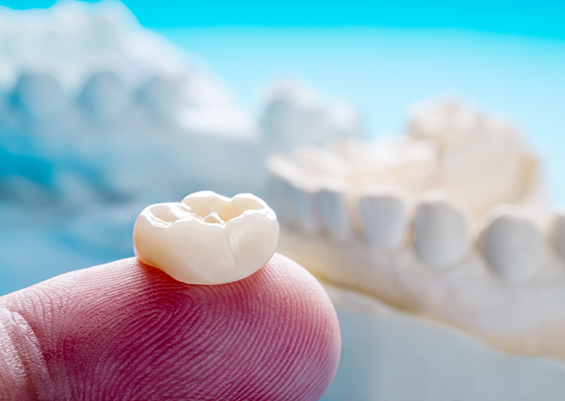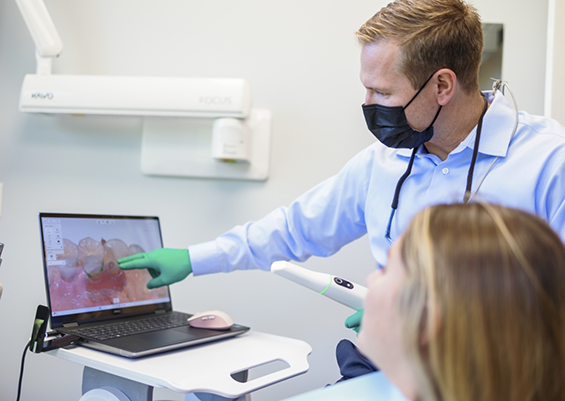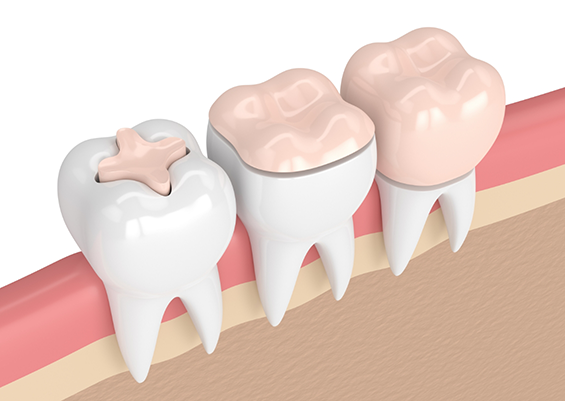Dental Crowns Ponte Vedra Beach
Let Us Restore the Strength, Durability, and Beauty of Your Teeth

Dental crowns are prosthetic devices used to restore the shape and function of a tooth. They fix teeth that have been damaged, malformed, or received extensive fillings or dental restorations. Essentially, a crown is a special cap that covers the part of the natural tooth that sits above the gum line. They become permanent once they are cemented into place.
Dental crowns in Ponte Vedra Beach accomplish the dual goals of giving you back the function and the appearance of your natural teeth. This makes them an ideal solution for numerous cosmetic and functional issues.
Why Choose Ponte Vedra Family Dentistry for Dental Crowns?
- Beautiful, Natural-Looking, Durable Materials Used
- Board-Certified Prosthodontist with Years of Experience
- Office with Advanced Dental Technology
Key Uses of Dental Crowns

- Prevent weak teeth from fracturing
- Restore a fractured tooth
- Prevent further tooth damage in order to avoid an extraction or dental implant
- Restore a tooth that has had a root canal treatment
- Replace a large filling in the case of severe decay
- Protect a jeopardized filling from dislocating
- Replace abnormal teeth for esthetic purposes
- Cover and complete a dental implant
- Attaching dental bridges
Types of Dental Crowns

Crowns can be made of various materials or combinations of materials. If your dentist feels a crown is the best treatment plan for you, you’ll need to consider the following options:
- Metal or Gold Crowns – Metal crowns are a great option for out-of-sight molars because they are quite strong and rarely break. Metal and gold crowns can withstand demanding chewing. They cause less wear and tear to your teeth than other types of crowns. Another benefit of this type of crown is that less of your existing tooth needs to be removed before placement. However, metal alloys or gold crowns do not look like your natural teeth.
- Resin-Based Dental Crowns – These crowns offer the benefit of being less expensive than other types. However, they are more likely to break than gold or porcelain crowns. Additionally, resin-based crowns tend to wear down over time from normal biting and chewing. For this reason, they typically need to be replaced more often than more durable crowns.
- Ceramic Crowns – All-ceramic crowns (white crowns) are an excellent choice for front teeth. They can be fabricated in a variety of colors and tints to match your natural teeth. However, ceramic crowns are not as strong as other types. They can break more easily. Ceramic crowns have the benefit of offering a solution for patients who are allergic to metals used in dentistry.
- Fused Porcelain Crowns – This type of crown is made of porcelain but fused to metal. It is quite strong. It also has the benefit of being color-matched to your natural teeth to ensure the most natural look possible. However, it’s important to know that the strength and durability of porcelain crowns mean they do cause the most wear on opposing teeth. They are also prone to chips and cracks.
What to Expect When Getting a Dental Crown

A dental crown procedure will usually take several visits. At the first visit, we will complete an examination of your mouth and take an X-ray. Typically, your natural tooth will be too large to accommodate a crown properly. Dr. Perry or Dr. De Bonis will reduce the size of the tooth as a first step. They will numb the tooth area to keep you comfortable. Then they will gently file down the sides and chewing surface of your tooth. This makes enough room for the new crown to fit properly.
Next, our dentists will take impressions of your tooth with a state-of-the-art digital scanner. This is so the lab can create a custom crown to suit your individual needs. This customization includes size and fit, but also the color and shape of your adjacent natural teeth. A perfectly fitting temporary crown can be placed while you wait for your custom crowns to be completed by the dental laboratory.
The final step is for our dentists to place your new crown on the prepared tooth. They will secure it permanently by cementing it into place.
A newly crowned tooth may be sensitive or slightly uncomfortable when the anesthesia begins to wear off after placement.
Caring for Your Dental Crowns

Crowns won’t last forever and will typically need to be replaced at some point. However, you can ensure your crowns last as long as possible by properly caring for them at home. You can extend the life of your crowns in two ways. First, brushing your teeth after each meal. Second, be sure to floss diligently around each crown to prevent the buildup of excess plaque.
Additionally, you should try to avoid certain behaviors. This includes tooth grinding (bruxism) and eating foods like hard candy or ice. They can cause damage to a crown or adhesion issues.
Why Choose Dental Crowns at Ponte Vedra Family Dentistry?

Dental crowns are an important general dentistry restoration technology. They allow American dental professionals to offer versatile solutions for protecting patients’ vulnerable or damaged teeth. They also provide a cosmetic dentistry option for a natural-looking smile.
Dr. Perry, Dr. De Bonis, and our skilled team know that a crown restores confidence in addition to esthetics and function. They are passionate about seamlessly incorporating a crown into your smile and transforming the way you feel about your teeth.
If you’re interested in a dental restoration tailored to your unique smile, call Ponte Vedra Family Dentistry today to schedule a consultation. We are committed to providing you with the information and encouragement you need in order to make the best oral health decisions for yourself and your family. We offer compassionate care from a staff who recognizes how life-changing dental restorations can be.
Your smile is worth it. Call us today and learn more about our services so we can begin restoring the strength, durability, and beauty of your teeth.
Dental Crown FAQs
What is the difference between a filling and a dental crown?
A filling is traditionally used to contain a small area of decay on a tooth surface. It is considered a minor procedure. It is usually done with a tooth-colored resin that hardens through the application of a special type of light. It is a quick procedure that protects the tooth for many years. A crown, on the other hand, is usually needed when the tooth structure has suffered severe damage or tooth decay. It covers over the entirety of the tooth enamel and biting surface. Crowns are custom fabricated in dental labs for specific patients, and the process of placing them takes longer than a simple filling. Sometimes, it may take more than one dental appointment.
Do dental crowns look natural?
Crowns have been used for many years. However, the crowns of generations past didn’t look very natural. Modern crowns, however, can be made from a variety of materials. Some of them look exceedingly natural and are indistinguishable from real teeth. This is important for front teeth, which are the most visible. Porcelain crowns even offer the ability to reflect light exactly as a natural tooth does.
Are dental crowns affordable?
Different types of crowns fall at different price points. Porcelain crowns are the most expensive and resin-based are the most affordable. If you have dental insurance, and a crown is needed for structural repair of a tooth, your insurance may cover all or some of the cost. On the other hand, crowns placed for cosmetic purposes are typically not covered by insurance. Ponte Vedra Family Dentistry is committed to offering affordable payment options for our patients. Talk with us to learn more about payment options.
Is a dental crown a permanent repair?
Crowns can last decades when properly cared for. They are permanently cemented into place in your mouth. However, crowns may need to be repaired or replaced over time, so they are not “permanent” in so far as being a lifelong solution. They will likely require maintenance or replacement at some point.
Will my dental crown ever need to be replaced?
Chances are, even with proper care and maintenance, your crown will need to be replaced at some point. This can happen simply due to the age of the crown, but replacement is also indicated when a crown breaks. You may also need a replacement if it begins to cause you pain or discomfort or if gum recession begins to expose the crown. Sometimes, tooth decay can begin around the margin of the crown where it meets your natural tooth. This makes it necessary to remove the crown in order to fill the cavity. Finally, your crown may also need to be replaced if you begin to notice a change in your bite.
